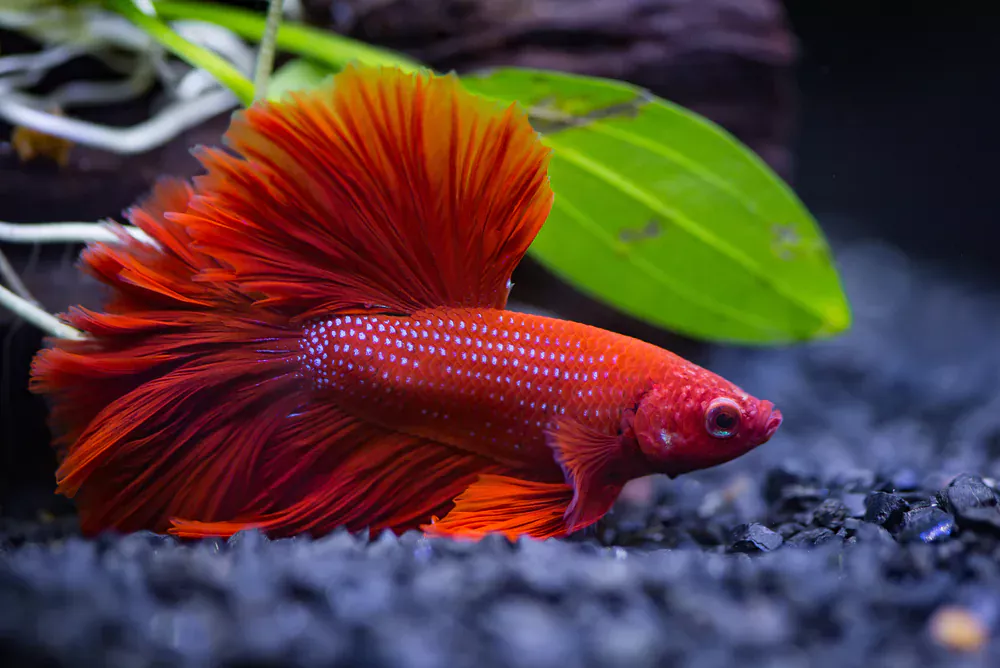Seeing your betta laying on bottom of tank is a common problem for lots of new aquarists. It is really important to correctly diagnose and treat this problem. There are many possible reasons for betta fish to lay on the bottom.
I’ve collected all the possible causes and symptoms of betta fish laying on bottom of tank in this blog because I found it way too hard to google it. All the causes are explained in detail and I even added how to help him/her get rid of most of those issues. This post was mainly written for the newbies. So let’s get started.
- 1 Betta Laying On Bottom Of Tank; Is This Normal Behavior?
-
2
List Of All The Possible Causes Of Betta Laying On Bottom Of Tank
- 2.1 1- Age
- 2.2 2- Too Hot Water
- 2.3 3- Too Cold Water
- 2.4 4- Suffering From Swim Bladder Disease
- 2.5 5- Ammonia Is Poisoning The Water
- 2.6 6- Excessive Current In The Tank
- 2.7 7- Nitrate Poisoning
- 2.8 8- Because Of Sickness Or Disease
- 2.9 9- The Tank is Not Large Enough
- 2.10 10- They’re Sleeping
- 2.11 11- Stress
- 2.12 12- Overcrowded Tank
- 2.13 13- Water Quality Is Poor
- 2.14 14- Not Enough Oxygen In The Tank
- 2.15 15- pH Level Is Too High Or Low
- 2.16 16- Overeating
- 3 Frequently Asked Questions (FAQs)
- 4 Wrapping Up
Betta Laying On Bottom Of Tank; Is This Normal Behavior?
Yes, it is normal for betta fish to lay at the bottom of the fish tank. However, if they keep doing this for more than a few days and you see some other signs then there might be something wrong with your betta fish.
List Of All The Possible Causes Of Betta Laying On Bottom Of Tank
Here are some possible causes of a betta laying on bottom of tank:
1- Age
Bettas have short lifespans compared to other types of tropical fish, with most living for about two years before dying from old age. As they age, they will become less active and spend more time resting at the bottom of their tanks or bowls instead of swimming around like they used to do when they were younger.
2- Too Hot Water
If you keep your betta in a fish tank that is poorly filtered, or if the filter isn’t properly maintained, it can cause the temperature of the water to get too high. If this happens, your betta will lay on the bottom of the tank and not move around much.
The first thing to do is make sure you have a good filter on your tank that is maintained properly. A good filter will help keep the water clean and clear, as well as cool it down if it gets too warm. The second thing to do is check with an aquarium thermometer to make sure that your tank water isn’t too warm for your betta fish.
3- Too Cold Water
The opposite problem from above can also occur, where the temperature of your tank water drops below what’s comfortable for your betta fish. If this happens, he may try and find somewhere warmer to go by laying on top of something like rocks or plants in order to keep himself warm enough to survive until things get better again in the fish tank.
4- Suffering From Swim Bladder Disease
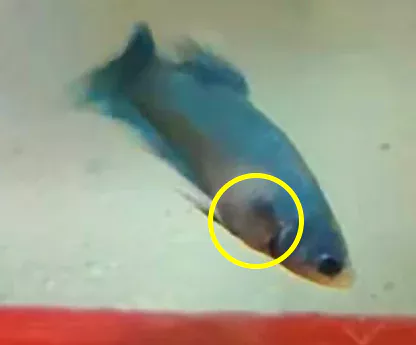
Betta fish have a swim bladder, which is a gas-filled organ that controls buoyancy. When swim bladder is damaged, it can cause betta fish to float upside down or lay on its side at the bottom of the fish tank. In some cases, swim bladder disease can cause your betta fish to become paralyzed and unable to move around at all.
5- Ammonia Is Poisoning The Water
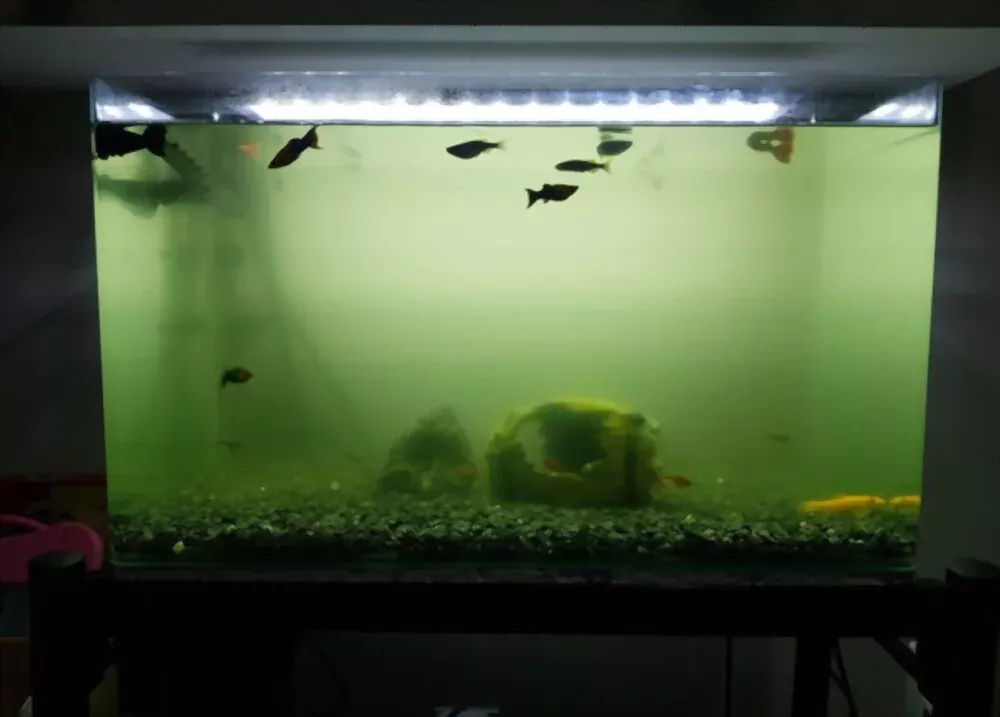
Ammonia poisoning is caused by something called ammonia burn, which occurs when ammonia levels in the water rise above zero parts per million (ppm). Ammonia is a toxic chemical that can kill fish if it builds up in their environment.
Ammonia burns can occur because of poor filtration or overfeeding, but they’re most often caused by bacterial infections that release ammonia into the water. If your betta has been laying at the bottom of his tank for a few days with no other symptoms besides lethargy, then he may be suffering from ammonia burn from bacteria living in his tank’s filter or gravel substrate.
6- Excessive Current In The Tank
If you have an aquarium with an under gravel filter (UGF) and you don’t use a powerhead or similar device to provide movement in the water column, then your betta may be lying on the bottom because it can’t handle the current from the UGF. This problem is worsened when there are plants in the tank because they reduce oxygen levels even further and create more current.
7- Nitrate Poisoning
This is the most common cause of laying at the bottom of your fish tank. Nitrate poisoning occurs when the nitrate levels in your water are too high. Nitrates are produced by beneficial bacteria in your aquarium, but they can also be produced by your fish. As long as you have a proper balance of nitrogen compounds in your aquarium, there is no problem with nitrates being present in your water.
However, if you add too many fish to your tank or if one of your existing fish begins to produce more waste than normal, then it may cause nitrate levels to rise significantly above normal levels. The higher the nitrate level becomes, the more likely it is that one of your fish will become sick and begin to lay on its side at the bottom of the tank because their gills become damaged by high levels of ammonia and nitrite (which are also produced by beneficial bacteria).
8- Because Of Sickness Or Disease
The other possible cause could be sickness or disease in your betta fish. If you see symptoms like clamped fins or swimming at the top of the water and not moving into a corner, then it is possible that your betta fish is suffering from sickness or disease which may be caused due to poor water conditions, bacterial infections, and parasites which are not visible to humans but can be seen by experienced aquarists who can diagnose what’s wrong with your fish based on their symptoms alone without any lab tests required.
9- The Tank is Not Large Enough
Betta fish is a tropical fish and needs a lot of space to move around. The tank should be at least 5 gallons for one betta fish. If you have more than one betta fish, the tank should be at least 10 gallons in size. Betta fish like to swim horizontally, which means that they swim on their side, not upright. If you have a very small tank, your betta may feel cramped in his environment and resort to laying at the bottom of the tank.
10- They’re Sleeping
Betta fish are known for sleeping at the bottom of their tanks during the day when it is too hot outside and there are not many things going on in their habitat (the aquarium). This behavior can be mistaken as “laying” by some people who do not know much about bettas or tropical fish in general. It is normal for bettas to do this, so don’t worry if your betta lays at the bottom of his tank while he is sleeping!
11- Stress
Stress can cause a variety of problems, including laying at the bottom of the tank. If you have recently added your betta fish to a tank with other fish, or if you have recently changed the water in your tank, then this may be causing him stress. He may also be stressed if he has been fighting with another fish in his tank for food.
To relieve stress on your betta fish, try adding more plants or hiding places for them to hide in. Also, try changing their diet from pellets to frozen foods and live foods like brine shrimp or bloodworms so they don’t feel so threatened when they see other fish-eating around them and they have something else they can eat without having to compete with other fish for it.
12- Overcrowded Tank

If you have too many fish in a small tank, your betta will not be able to swim around easily. This could cause stress and the fish may lay at the bottom of your tank. If you notice this behavior, you should move the fish to another larger tank or increase the size of their current tank by adding more water and more decorations.
13- Water Quality Is Poor
If your water quality is poor, then it can cause many health issues for your betta fish. It may also lead to stress which may cause them to lay at the bottom of their tanks or even stop eating altogether! To check for water quality, take a sample of your water and send it off for testing at a local pet store or aquarium shop.
You can also buy some test kits online or at any pet store and do your own testing at home. If there are any problems with your water quality, then fix them immediately before it gets worse and causes serious health problems for your betta fish!
14- Not Enough Oxygen In The Tank
Oxygen is very important to the health of your fish, especially if you have them in a small tank. If there is not enough oxygen in the water, the fish will have to use all of their energy just to stay alive and they won’t have any energy left over to feed themselves. This can lead to starvation, which can be fatal for your betta.
This can also happen when you keep your aquarium in a room where there is no ventilation or if there is no filter installed on it.
15- pH Level Is Too High Or Low
pH level is an important factor that needs to be taken care of while keeping any kind of fish inside our aquariums. The ideal pH level for a Betta Fish is between 6 and 8 but if the pH level goes above or below this range then it can lead to serious problems for your betta fish.
If the pH level of your aquarium water goes above 8 then it will cause an increase in alkalinity which leads to stress in betta fishes and other types as well. Similarly, if the pH level goes below 6 then it will reduce alkalinity which may also cause stress in your betta fish.
16- Overeating
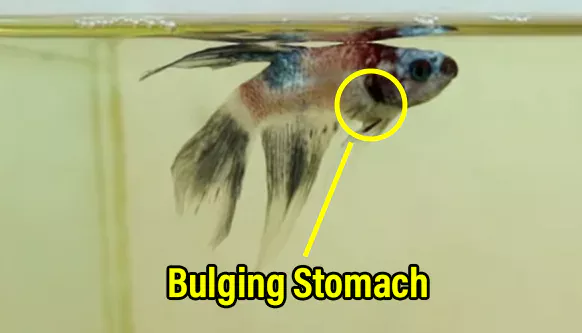
Overfeeding is another possible reason why your betta may be laying at the bottom of its tank. Betta fish are omnivores and will eat just about anything they can get their mouth on! They tend to overeat when given too much food at once because they are greedy little creatures who like to eat all day long.
If this happens, your betta will become bloated from eating too much and may even die from bloating if not treated immediately! When feeding your betta fish, only give them as much food as they can eat within 1 minute or less (if possible). If there is any leftover food after this time period has elapsed, then remove it immediately.
Frequently Asked Questions (FAQs)
Betta Laying On Bottom Of Tank Gasping
If your betta is laying on the bottom of the tank gasping, You need to do something immediately.
There are a few reasons why your betta may be gasping:
- Check the oxygen levels in his tank by placing an aerator on top of his tank. You also want to make sure there isn’t any ammonia poisoning in the tank.
- You have overfed your fish. If you feed your betta more than they can eat in 2 minutes, they will be swimming around with a full belly and maybe lethargic or gasping for air. Try feeding them only once per day and not overfeeding them!
- Your betta has been stressed out from moving from one tank to another and needs time to adjust. Give them some time to settle into their new environment before feeding them again!
New Betta Laying On Bottom Of Tank
If you have a new betta fish and it’s laying on the bottom of the tank, this is likely due to stress. Betta fish are very sensitive and can be easily stressed or frightened by things that we don’t notice.
Common causes of stress in new betta fish include:
- Moving them into a new tank
- Loud noises such as thunderstorms or fireworks
- Being handled too much by children or pets (even when they’re trying to help)
One way to help your new betta recover from these stresses is by giving him time to adjust. It may take a few days for him to start acting normal again but he should recover fully after several weeks. In the meantime, be sure not to touch him or make any loud noises around him so that he doesn’t become even more frightened than he already is.
Betta Laying On Bottom Of Tank Sideways
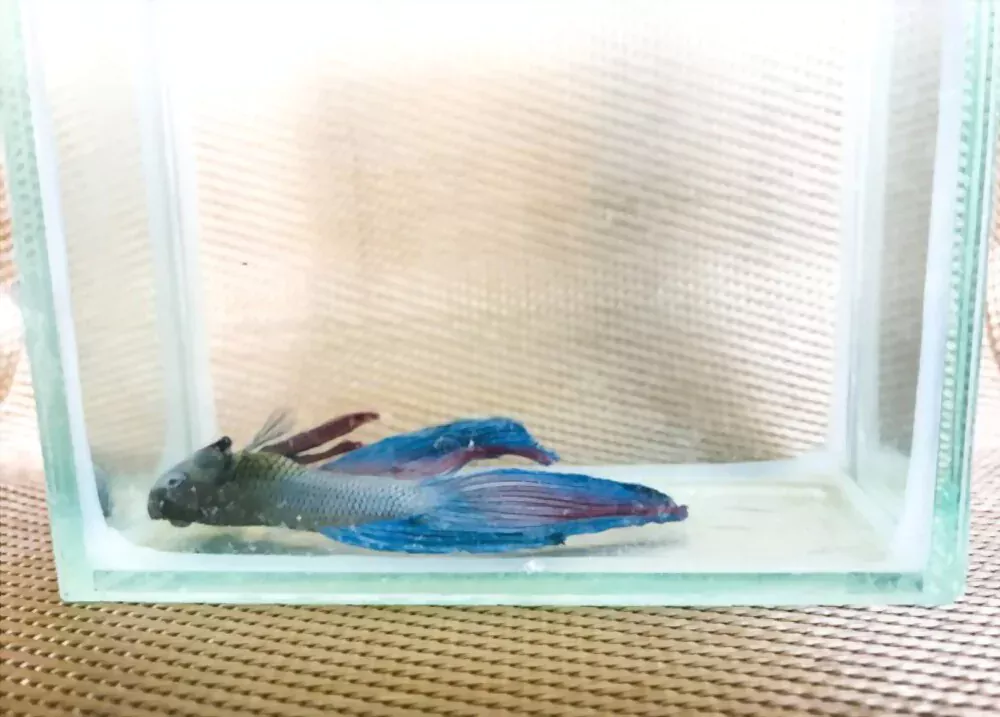
One of the signs of a sick betta is when they start to lay on the bottom of their tank. Betta fish tend to rest at the bottom of their tanks because they prefer cooler water and they can also hide from other fish in there.
However, if your betta is laying on its side, this could be a serious problem. I would recommend seeking help from a local pet store.
Betta Laying On Bottom Of Tank After Water Change
If you have recently changed the water in your tank and your betta is laying on bottom of tank after doing so, then there is nothing for you to worry about. It should only take a few days for him to get used to all of these changes and start swimming normally again.
If it has been longer than 3 days since you changed the water in your tank and your betta is still laying on bottom of tank, then you may want to consider taking him out of its current environment and putting him into another one until it feels better.
Wrapping Up
The above-listed of “All The Possible Causes Of Betta Laying On Bottom Of Tank” has covered most likely all the causes. While, to an experienced betta keeper, these factors might all seem like very basic ones. But many new betta aquarium owners might find this list useful. Certainly, there may be more factors that can cause your betta fish to lay at the bottom, but I’m fairly sure that the information above should have covered most of them.
Please keep in mind, that there may be some cases where the cause of your betta fish laying at the bottom of tank can be fixed easily, but there are many other cases where the cause will require a bit of careful consideration before taking any decision. Either way, it is always best practice to consult a veterinarian with expertise in fish care.

